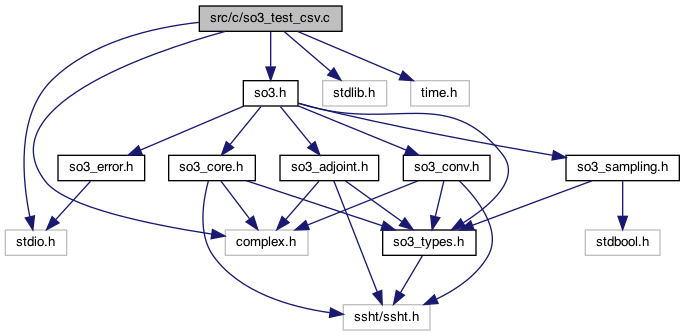
Macros | |
| #define | NREPEAT 10 |
| #define | MIN(a, b) ((a < b) ? (a) : (b)) |
| #define | MAX(a, b) ((a > b) ? (a) : (b)) |
Functions | |
| double | get_max_error (complex double *expected, complex double *actual, int n) |
| double | ran2_dp (int idum) |
| void | so3_test_gen_flmn_complex (complex double *flmn, const so3_parameters_t *parameters, int seed) |
| void | so3_test_gen_flmn_real (complex double *flmn, const so3_parameters_t *parameters, int seed) |
| int | main (int argc, char **argv) |
Detailed Description
Applies SO3 algorithms to perform inverse and forward Wigner transforms (respectively) to check that the original signal is reconstructed exactly (to numerical precision). Test is performed on a random signal with harmonic coefficients uniformly sampled from (-1,1), once for a real and once for a complex signal. This test is run for multiple values of L and outputs the results in CSV format (to stdout). If no value for N is given in the arguments, each test will run with N = L, otherwise all tests will be run with the given N (and tests with L < N will be skipped). L will take all powers of 2 less or equal than the given Lmax. If L0 is given, all powers of 2 less than or equal to L0 will be skipped (and L0 will be used as the lower band-limit for all transforms).
- Usage
- e.g.so3_test_csv [Lmax [L0 [N]]]Defaults: L = 64, L0 = 0, N = Lso3_test 128 0 4
To save it to a file, just use something likeso3_test_csv 64 7 4 > test.csv
Macro Definition Documentation
◆ MAX
| #define MAX | ( | a, | |
| b | |||
| ) | ((a > b) ? (a) : (b)) |
◆ MIN
| #define MIN | ( | a, | |
| b | |||
| ) | ((a < b) ? (a) : (b)) |
◆ NREPEAT
| #define NREPEAT 10 |
Function Documentation
◆ get_max_error()
| double get_max_error | ( | complex double * | expected, |
| complex double * | actual, | ||
| int | n | ||
| ) |
◆ main()
| int main | ( | int | argc, |
| char ** | argv | ||
| ) |
◆ ran2_dp()
| double ran2_dp | ( | int | idum | ) |
Generate uniform deviate in range [0,1) given seed. (Using double precision.)
- Note
- Uniform deviate (Num rec 1992, chap 7.1), original routine said to be 'perfect'.
- Parameters
-
[in] idum Seed.
- Return values
-
ran_dp Generated uniform deviate.
◆ so3_test_gen_flmn_complex()
| void so3_test_gen_flmn_complex | ( | complex double * | flmn, |
| const so3_parameters_t * | parameters, | ||
| int | seed | ||
| ) |
Generate random Wigner coefficients of a complex signal.
- Parameters
-
[out] flmn Random spherical harmonic coefficients generated. Provide enough memory for fully padded storage, i.e. (2*N-1)*L*L elements. Unused trailing elements will be set to zero. [in] parameters A parameters object with (at least) the following fields: L0, L, N, storage, n_mode The reality flag is ignored. Use so3_test_gen_flmn_real instead for real signals. [in] seed Integer seed required for random number generator.
- Return values
-
none
◆ so3_test_gen_flmn_real()
| void so3_test_gen_flmn_real | ( | complex double * | flmn, |
| const so3_parameters_t * | parameters, | ||
| int | seed | ||
| ) |
Generate random Wigner coefficients of a real signal. We only generate coefficients for n >= 0, and for n = 0, we need flm0* = (-1)^(m)*fl-m0, so that fl00 has to be real.
- Parameters
-
[out] flmn Random spherical harmonic coefficients generated. Provide enough memory for fully padded, complex (!) storage, i.e. (2*N-1)*L*L elements. Unused trailing elements will be set to zero. [in] parameters A parameters object with (at least) the following fields: L0, L, N, storage, n_mode The reality flag is ignored. Use so3_test_gen_flmn_complex instead for complex signals. [in] seed Integer seed required for random number generator.
- Return values
-
none